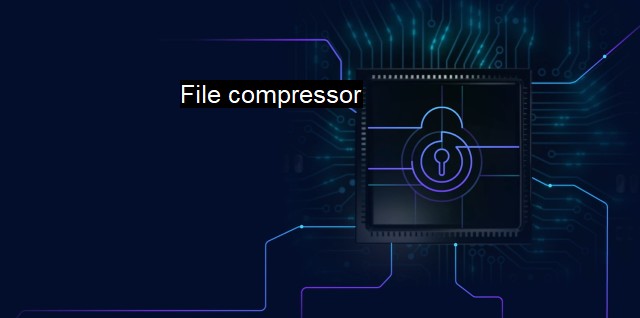What is File compressor?
The Importance of File Compression in Cybersecurity: Minimizing Storage Space and Enhancing Data Protection
File compressors are a type of utility software that allows users to compile files into compact digital containers for easy transmission and efficient storage. When file compression is applied, various algorithms work to eliminate and reduce redundancies, minimize detailed file information and strategically encode data into a smaller number of bits. While this functionality has enabled efficient data management and improved information transmission across networks, it has also been identified as a potential security concern within the domains of cybersecurity and antivirus.File compression algorithms work by recognising patterns and redundancies in the digital stream. Algorithms include the likes of Huffman coding and Lempel-Ziv-Welch (LZW) that form the basis of popular compression tools such as WinZip and gzip. These programs deliver files in much smaller sizes, making them easy to share across networks and significantly save storage space in disk drives, cloud servers, and USB sticks. Yet when we talk about cybersecurity and antivirus, it is necessary to reckon with the fact that these functionalities could be harnessed by cybercriminals.
The concept of file compressors blends seamlessly with both cybersecurity and antivirus in a number of ways. To begin with, compression can aid in protecting privacy and maintaining secrecy, as some file compressors incorporate password protections and even encryption, adding an extra layer of security. Therefore, sensitive files compressed with such features are less prone to unauthorized access.
The same compression technologies that enable this privacy can also be deployed in nefarious ways. File compressors have been utilized by cybercriminals as a mechanism to transmit malicious content covertly. By compressing and encoding malicious software or malware within ordinary-looking files, hackers can evade detection techniques employed by standard antivirus software programs. The supposed regular files appear innocuous to unwary users and ordinary antivirus systems, when in truth, they contain executable codes that can harm computer systems or pilfer sensitive information.
Some popular antivirus programs have now included a feature to scan inside compressed files, recognising the susceptibility of compressed files being used to veil harmful programs. While there's a level of security provided by these antivirus programs, the cat-and-mouse game that ensues between hackers and cybersecurity professionals means that techniques are forever evolving on both sides. Vector-changing viruses and polymorphic malware are now common, some of them having the capability to evade even updated virus signatures in antivirus programs. Therefore, it becomes increasingly challenging to robustly ensure security when dealing with compressed files.
There is also the problem concerning ransomware. Specific forms of ransomware are known to employ compressed files to infiltrate computers. Once on a system, the ransomware encrypts all data until a certain fee or “ransom” is paid. Among this ransomware type, some significant strands have been noted, utilizing names of well-known file compressors to trick users into believing that they are downloading helpful software.
In sum, while file compressors serve an essential function within the digital world by promoting efficiency and even implicitly guarding privacy, their potential abuse makes them a topic of concern within cybersecurity. Yet, as the fulfillment of data compression inevitably continues, and as long as there are bad actors intent on compromising systems, the cybersecurity industry must continue to evolve and strengthen their defenses when dealing with compressed files. Antivirus software, too, must maintain a dynamic approach to combating these risks, providing robust algorithms and comprehensive security measures to ensure safety even in the face of ever-adapting threats.

File compressor FAQs
What is a file compressor and why would I need it in cybersecurity?
A file compressor is a program used to reduce the size of files, which makes them easier to transfer and store. In cybersecurity, file compressors can be useful for reducing the size of potentially dangerous files, like malware, to minimize the risk of spreading them.Can a file compressor help with antivirus protection?
Yes. Compressing files can make it easier for antivirus software to detect and remove potentially harmful files. Many antivirus programs are designed to scan inside compressed files, which can help them find and eliminate malware before it can cause damage.Are file compressors safe to use with sensitive data?
It depends on the file compressor and how it is used. Some file compression tools may offer a higher level of security, such as password protection or encryption, which can help keep sensitive data safe. However, it's important to choose a reputable file compression program and use it correctly to ensure that your data is secure.What are some popular file compressor programs for cybersecurity purposes?
There are many file compressor programs available, but some popular options for cybersecurity include WinZip, 7-Zip, and WinRAR. These programs offer compression features and can also be used to password protect and encrypt files for added security.| | A | | | B | | | C | | | D | | | E | | | F | | | G | | | H | | | I | | | J | | | K | | | L | | | M | |
| | N | | | O | | | P | | | Q | | | R | | | S | | | T | | | U | | | V | | | W | | | X | | | Y | | | Z | |
| | 1 | | | 2 | | | 3 | | | 4 | | | 7 | | | 8 | | |||||||